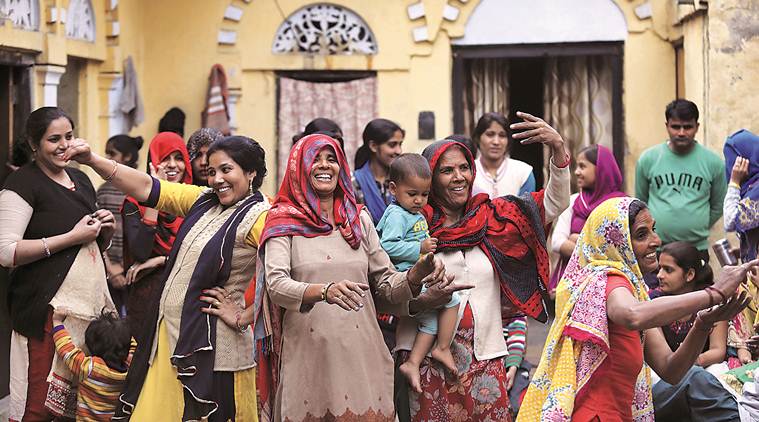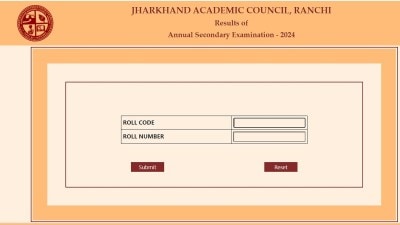- India
- International
Oscars 2019: Red carpet in Los Angeles, supporting cast in Hapur
Period. End of Sentence delves deep into the world of stigma, shame and prejudice attached to menstruation and focuses on a group of women who make low-cost sanitary napkins in a small two-room workshop addressed colloquially as the ‘Unit’ by the villagers.
 Celebrations at Khatikhera in Hapur. (Express photo: Abhinav Saha)
Celebrations at Khatikhera in Hapur. (Express photo: Abhinav Saha)
Multiple batches of tea have been served since morning, the cellphones have been ringing non-stop and the courtyard of the Tanwar family has never had as many visitors — not even at weddings.
A popular folk song, ‘Bansi baja ke mana lenge’ was rendered in multiple variations to the beat of the dholki and even the humble brass paraat was beaten with a spoon in a staccato tempo. And when things got dull, the women would just hum the song.
Khatikhera, about 80 km from New Delhi, is all about celebration on Monday. For, this is where Period. End of Sentence, which won the Academy Award for Best Documentary Short Subject, is based. Directed by Rayka Zehtabchi, it was shot entirely in Khatikhera, which is home to about 3,500 people — more than 50 feature in the 25-minute documentary.
And most of them are women. Like Poonam, who is part of the Tanwar family. “We came to know of the win at 7 am when Suman bhabhi’s husband got the call. We have not stopped dancing since, aas paas 2-3 dukaanon ki mithai bhi humne khatam kara di hai (We have finished all the sweets from 3-4 shops).”
Read | Producer Guneet Monga on India’s Oscar win: Glad that God chose this film because it’s important

“We have called for more. We now realise the importance of the Oscar win. Bollywood, Hollywood, aur jitne bhi aise jagah hain, wahaan sab main jeete hain hamari film (Bollywood, Hollywood and others like it, we have won awards in all of them).”
Her sister-in-law Suman and Sneha Tanwar, another local girl who is among the chief voices in the documentary, have flown to attend the Oscars in Los Angeles.
Made in 2018, the documentary delves deep into the world of stigma, shame and prejudice attached to menstruation and focuses on a group of women who make low-cost sanitary napkins in a small two-room workshop addressed colloquially as the ‘Unit’ by the villagers. It’s currently streaming on Netflix.
“We don’t know anyone from our village who has travelled outside the country. And here, our story, our girls have gone and made history. I spoke to Sneha last night, she was very nervous. We had never thought of these things for her or even this Unit. When she started talking of women’s issues as she grew up, initially, we were apprehensive,” said Sneha’s mother Urmila (46).
Period unfolds mostly through Sneha’s voice, as the 22-year-old narrates and guides the camera through the labyrinthine brick lanes of Kathikhera and neighbouring villages. She has been training intensely to qualify for the Delhi Police.
“She sees the ‘danda’ as the only way to wield the power necessary for women’s safety. She has always been fiery and we didn’t know how to help her but she paved her own way,” said her father Rajendra Tanwar (50).
The manufacturing unit called Sabla Mahila Udyog is set up on the premises of the Tanwar household. It produces more than 600 sanitary napkins a day, with a workforce of seven — all women — who get paid about Rs 2,500 a month. The pads are sold in a pack of six, for Rs 20.
“This is the fruit of 20 years of hard labour. In the beginning, we got brickbats, loads of them. People would turn us away from their doors. But now — look around you, all the men are standing on the sidelines, and women are dancing and singing,” said Shabana Khan, area co-coordinator, Action India, which helped set up the Unit.
“When I started coming here, my family objected. But I told them that I am just sitting unemployed at home. But here, they think it’s a safe environment as only women work here. And I make money in the process. Though I would want to go back to school,” said Arshi, 18, who dropped out of school after Class VIII, once she hit puberty.
Read | Oscars 2019: A review
And Arshi is just one example. Many women in Khatikhera drop out of school once they start menstruating. The lack of proper hygiene and information about reproductive health and almost no options for affordable sanitary pads are among the main reasons for this.
“See, if you think that things will change to the point as they show in TV ads, then we are being unrealistic. At least now in the village, women can talk about it between themselves and to their husbands. The conversation has started and the shame has lessened,” said Khan.
Photos
Apr 19: Latest News
- 01
- 02
- 03
- 04
- 05








































